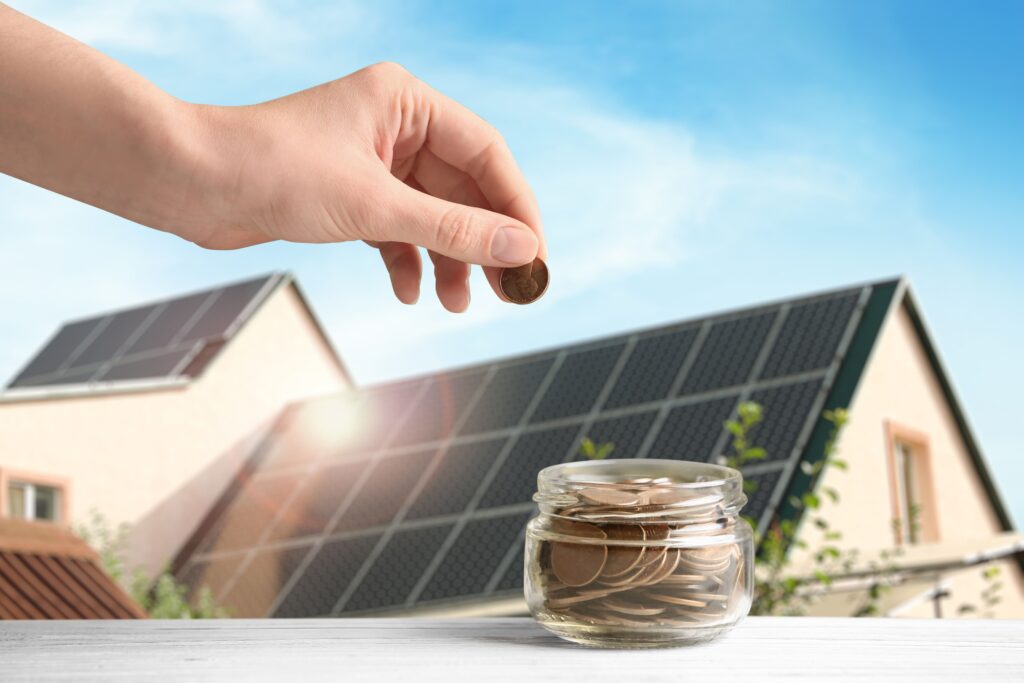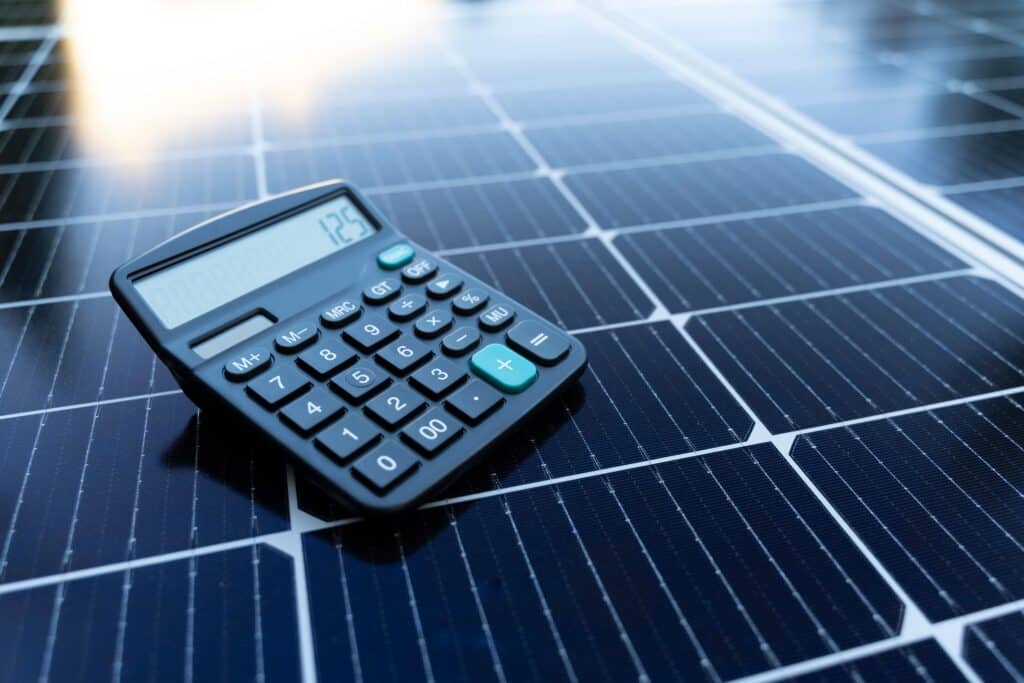Do You Really Save Money With Solar Panels?
Do solar panels really save you money? The answer is yes. Over a lifetime, you can save anywhere from $10,000 to $90,000 on electricity. The amount you will save depends on several factors. Local electric rates play a huge part in determining how much money solar energy can save you. The higher the rates, the more you save. Your home’s size and amount of direct sunlight also play a role in determining how much money solar energy can provide. Once a solar panel system is installed, the solar panel installation in New Jersey starts immediately.
Solar customers on average save about $1,500 each year from switching to solar energy. Although this number relies on a number of factors, no matter the size of your system, you will save money. Every home and location is different, so homeowners’ savings with solar will be different as well.

How Much Can Solar Panels Save You?
In order to understand how much solar panels save per month, you must calculate how much electricity you currently use and spend each year. The more you spend on electricity, the more solar panels can offset your bill. According to the U.S. Energy Information Administration, the national average cost per kilowatt-hour is 14 cents. Every year this national average increases by around 1.3%.
For example, in New Jersey, the average electricity rate is 16 cents per kilowatt-hour. The average price for a solar system in New Jersey is $12,166, so in 20 years, average savings will be $22,401. Average savings with solar panels differs state to state depending on a number of factors.
Your home’s electricity usage also plays a role in determining how much solar panels can save you. If you have high electricity usage, your home will need more solar panels than usual. If your home also has a small roof, you will not be able to collect as much energy as someone with more space on their rooftop. However, if your home lacks rooftop space, but has low energy usage, energy costs may be low.
Will You Still Have An Electric Bill?
The short answer is yes. You will still have an electric bill after having solar installed. However, depending on how much energy your solar panels absorb, your bill may not request payment. No matter your home’s energy usage, your electricity bill will be lowered. If your solar produces more energy than you use, you will not have any payment beyond a minimal grid connection fee. If your home uses more energy than your system produces, which can be caused by several factors, you will have to pay the offset. Installing solar panels will lower your monthly electric bill and in some cases may even eliminate your bill completely.
How Much Money Do Solar Panels Save
Solar energy saves money! As soon as your solar system is installed and turned on, you start saving immediately. Your investment starts paying for itself! The more power your panels produce, the more you save. Solar panels can even increase your home’s value on average by $9,274. So even if you sell your house, your solar panels are still saving you money.
Homeowners who live in extremely sunny areas with high electric rates will find that they save the most from switching to solar energy. Homeowners in California may save up to $90,000 in 25 years due to their electric rates and large amount of sunshine. Even homes in cloudy areas save from switching to solar. Average savings with solar panels vary due to a number of factors, but one thing all solar customers have in common is that they save money with solar.
The larger the roof, the more room for solar. However, rooftop space and solar-available rooftop space are different. Even if you have a large roof, you may not be able to fit as many panels as you thought. Factors such as the placement of chimneys, generators, and other appliances can limit the amount of solar-available space. This affects the amount and place solar panels can go. The more panels you have, the more energy you can generate. Contractors will be able to review your home and identify how many panels can fit.
Location, Location, Location
Your home’s location plays a huge role in determining your average savings with solar panels. Solar energy saves money, but your location may affect how much. Certain locations have lower grid electricity costs such as Arkansas and Georgia. Their cost for kilowatt-hour is around $8 to $9, whereas states like Hawaii have costs up to $28 per kilowatt-hour. Costs also vary within states too.
The location of your home or building in relation to other buildings and trees plays a role in how much money solar panels can save you. During the day buildings and trees can shade your roof, lowering the amount of energy you can produce.
Don’t believe solar myths. Even the cloudiest of states are succeeding with solar. States like Washington and Oregon are having great success saving with solar energy. Some believe solar panels do not work in cold climates. Solar panels actually are more efficient in the cold. Of course sunny states will be able to generate more solar energy than areas with less sunlight but, solar panels are still incredibly efficient in areas you wouldn’t think possible.

Net Metering
Solar systems can pull more energy than you need in a month. Net metering policies, which vary state to state, can reward ratepayers for this energy. “It enables customers to receive full retail credit on their utility bill for each kWh of electricity their system produces over the course of a year” as stated by the New Jersey Clean Energy Program. Excess generation of your solar system creates credit on your utility bill at the wholesale value of electricity. The more power you produce, the more you can save.
Solar Incentives
In the government’s attempt to move towards renewable energy, taxpayers are now incentivized to switch to solar energy. Recently, Congress passed the Inflation Reduction Act that gives huge incentives for homeowners and consumers to switch to renewable energy sources. Consumers who install solar by the year 2033 can claim a 30% tax credit off their bill. The federal solar tax credit drops to 26% in 2033 and then continues to drop as years go on, ending in 2035 unless renewed by Congress. The credit makes it so that consumers go solar sooner rather than later. The sooner you install, the more you can receive.
Federal Solar Tax Credit
As long as you own your own solar system and are a U.S. homeowner, you can claim the federal solar tax credit. Once you claim the credit, if the funds are not used completely, it will rollover to the next year. The credit is a deduction, not a refund. The credit will be deducted from your federal income taxes until it’s gone.
There may even be property and sales tax exceptions depending on the state you live in. You may be able to receive rebates in addition to the Incentive Tax Credit. Checkout the Database of State Incentives for Renewable Energy to see what credits are available in your state.
Solar Energy Saves More Than Money
It’s a fact that solar energy saves money. Money is not the only thing being saved by switching to solar energy. With the implementation of solar energy and erasing your traditional electric system, you help reduce harmful greenhouse gasses. A 2kW system with an annual solar energy production of 2,840kWh will reduce carbon emissions by 2.2 metric tons. A 15kW system producing 21,300kWh of solar energy will reduce carbon emissions by 15.8 metric tons. A typical car emits 4.7 metric tons of carbon dioxide. A 6kW system would completely offset the emissions created by a car. Implementing solar makes an impact. No matter the size of your system, you are making a positive difference in the environment.
Solar Panels Pay for Themselves
There are many factors that affect how long it will take for a solar system to pay for itself. Your average electricity use and solar generation play a role in determining how long the payback period is. Financial incentives can make your payback period shorter. The initial cost of your installation is also important. On average, it takes homeowners around 7 to 8 years to completely cover their initial solar cost. Once your system pays for itself, you will find that you have a great reduction in the amount of money spent on electric bills.

What’s Stopping You?
Of course there are drawbacks to every purchase you make. For solar panel installation, the initial investment may seem overwhelming. Solar Panel Installation in New Jersey can be more expensive than traditional energy generators. However, this investment pays for itself in the long run. There are many different ways you can reduce your solar installation cost. There are financial incentives, rebates, and tax credits available to lower your initial cost. Currently, homeowners who install solar receive a 30% tax credit off their yearly income tax. The government wants to help make solar energy more available by alleviating some of its cost.
The intermittency of solar panels can also be a reason you have reservations about switching to solar. Although solar panels produce less energy at night and on cloudy days, it shouldn’t be a reason you decide not to switch. Solar panels, even in the cloudiest of areas, are saving people money.
Solar Benefits
Switching to solar energy has a plethora of benefits of Solar Panels. From lowering your carbon footprint to boosting the curb appeal of your home, solar panels save much more than money. Once you replace traditional electricity means and switch to solar energy, you are making a difference for future generations. Your contribution to creating change may seem small, but it is definitely not unnoticed. Every contribution to change is huge. Change does not happen overnight. Small wins put together make big changes!
So the answer to “how much do solar panels save per month” is a bit complicated. With the right information, you will be able to make an educated decision about your purchase and determine your future savings. Learn more about how solar may work for your home here.
